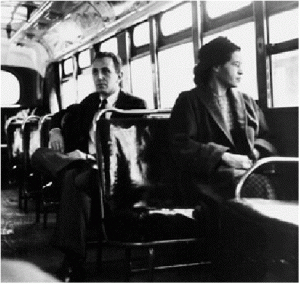
Little people can change the world. That’s what makes history so great sometimes: the courageous audacity of unassuming persons can transform nations. In the case of Rosa Parks, a little old lady in Alabama, a movement was born to bring equality and justice to all. Parks’ courageous audacity to defy an unjust law led to the American Civil Rights movement as we know it. We may acknowledge Martin Luther King and countless others as great Civil Rights leaders but it all started with a little old lady in Alabama.
In the 1950s, the South was ruled by “Jim Crow” laws. These laws regulated African-Americans to second class citizens. One such law declared that whites were to sit at the front of city buses. If an African-American passenger was sitting up front, they would be forced to move to the back or stand. This was an unjust law to begin with, but imagine the situations which ensued, such as old ladies being forced to give up their seats to young men (just the opposite of how it should be). Some people had resisted the law, they had faced severe consequences. A fifteen year old girl named Claudette Colvin was arrested because she refused to give up her seat.
On December 1, 1955, Rosa Parks, an advocate of the NAACP (National Association for the Advancement of Colored People), was riding a bus in Montgomery, Alabama. A white man boarded the bus and Parks and those sitting next to her were ordered to the back of the bus. Parks refused and she was arrested. That single act of defiance was perhaps the most influential event in the Civil Rights movement.
Upon Parks’ arrest, the African-Americans of Montgomery were urged to stop riding the bus during the day of Parks’ trial. The African-American population of Montgomery stopped riding the bus. They took cabs or just walked. This hurt the bus business in Montgomery. (It was estimated that African-Americans made up approximately three-fourths of the Montgomery bus riding population.) During the boycott, Martin Luther King Jr. emerged as a charismatic and passionate leader. The boycott ended when the segregated bus law was declared unconstitutional. The NAACP celebrated victory but kept their eyes on a greater vision–justice, freedom and equality for African-Americans in all of society, not just buses.
The Montgomery Bus Boycott was the foundation of the Civil Rights movement which in turn was the crowning agenda of the American people in the 1950s and 1960s. It all started with the audacity of one little old lady to resist an unjust law, no matter the consequences. She couldn’t be held down. It makes you wonder what you can do to change the world. It doesn’t need to be big, maybe just sitting down and staying seated when everyone around you is standing up and moving to the back.
